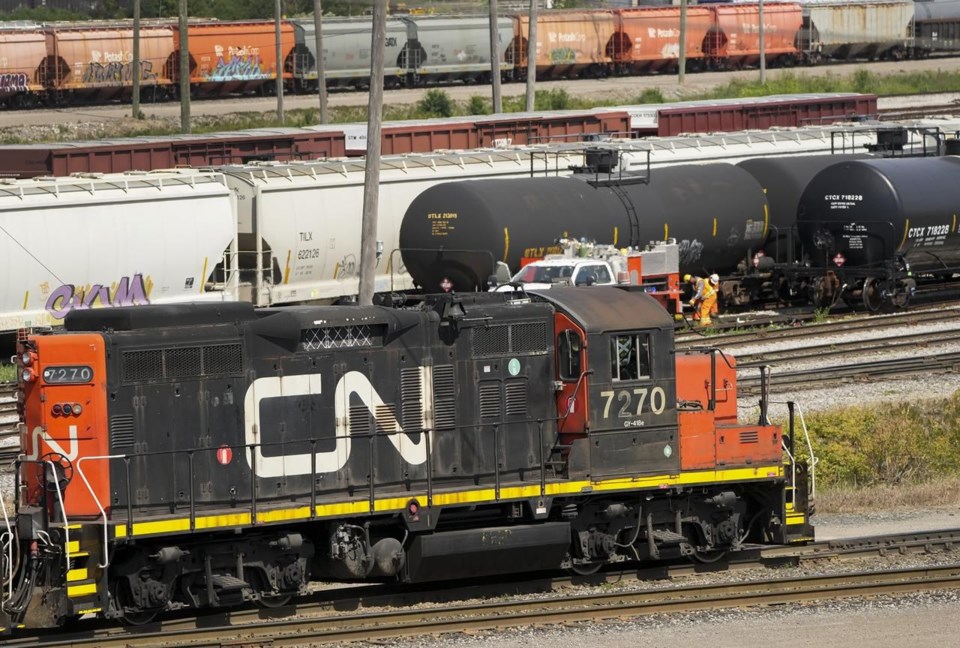MONTREAL — Canada's largest railway said the СŔ¶ĘÓƵ port strike will take two months to recover from, adding to the headaches of a company that lowered its earnings forecast amid falling profits brought on by a sluggish economy and a slew of natural disasters.
Canadian National Railway Co. said Tuesday it now expects flat to slightly negative adjusted diluted earnings in 2023, instead of the mid-single-digit growth it predicted three months ago.
Lower consumer demand as well as disruptions caused by wildfires reduced freight service over the second quarter, especially for containers and lumber products, CN said.
"The heat and the wildfires in parts of both Eastern and Western Canada over the last few months have impacted our operations and the operations of some of our customers, and that's had a temporary impact on volume. And we've seen more generally a softer volume market economically, particularly in some of our commodities segments," chief executive Tracy Robinson told analysts on a conference call.
However, the company's goal of ramping up profitable growth through 2026 and beyond remains on track, she insisted, even as the railway taps the brakes on its hiring plan amid economic shudders.
“The longer-term fundamentals remain strong," she said. Robinson stressed factors that remain firmly within CN's control — on-time performance, safety and velocity — which all saw their metrics improve over 2022.
Beyond its grasp were the wildfires that have raged across the country over the past two months, numbering nearly 900 last week.
The flames halted operations at lumber mills amid rolling evacuations. “Most of the business lost in Q2 will not be recoverable," said chief marketing officer Doug MacDonald, referring to forest product shipments.
Over the weekend, torrential rains and flooding in Nova Scotia severed a key rail link to Central Canada and the U.S. after a washout left a stretch of CN track sagging unsupported above a massive ditch where a culvert once lay, stopping train shipments from the Port of Halifax.
On the other side of the country, a roughly two-week strike at СŔ¶ĘÓƵ ports earlier this month halted freight flows through West Coast terminals.
The disruption will have a "minor impact" on earnings this quarter, MacDonald said. But he projected it will take eight weeks to clear the backlog caused by the labour action.
Meanwhile, "a little more weakness on the economic front” means overall shipments will likely continue to drop throughout the year, Robinson said. Softer demand, especially for container cargo, will likely continue into 2024, she added.
The forecast marks a contrast to the sunny outlook offered by the CEO three months earlier, despite expectations of a shrinking economy throughout much of the year.
The company is also taking steps to mitigate the fallout from extreme weather in the future, installing larger culverts, sprinklers and pumps at various sites, said chief operating officer Ed Harris.
"We just can't go through this type of disruption anymore, to be honest about it," he said.
In the quarter ended June 30, net income fell by 12 per cent to $1.17 billion from $1.33 billion a year earlier, CN reported.
Revenues in its second quarter dropped seven per cent to $4.06 billion from $4.34 billion in the period a year earlier.
On an adjusted basis, diluted earnings per share decreased nine per cent to $1.76 from $1.93 the year before. Analysts had expected $1.82 per share, according to financial markets data firm Refinitiv.
This report by The Canadian Press was first published July 25, 2023.
Companies in this story: (TSX:CNR)
Christopher Reynolds, The Canadian Press




